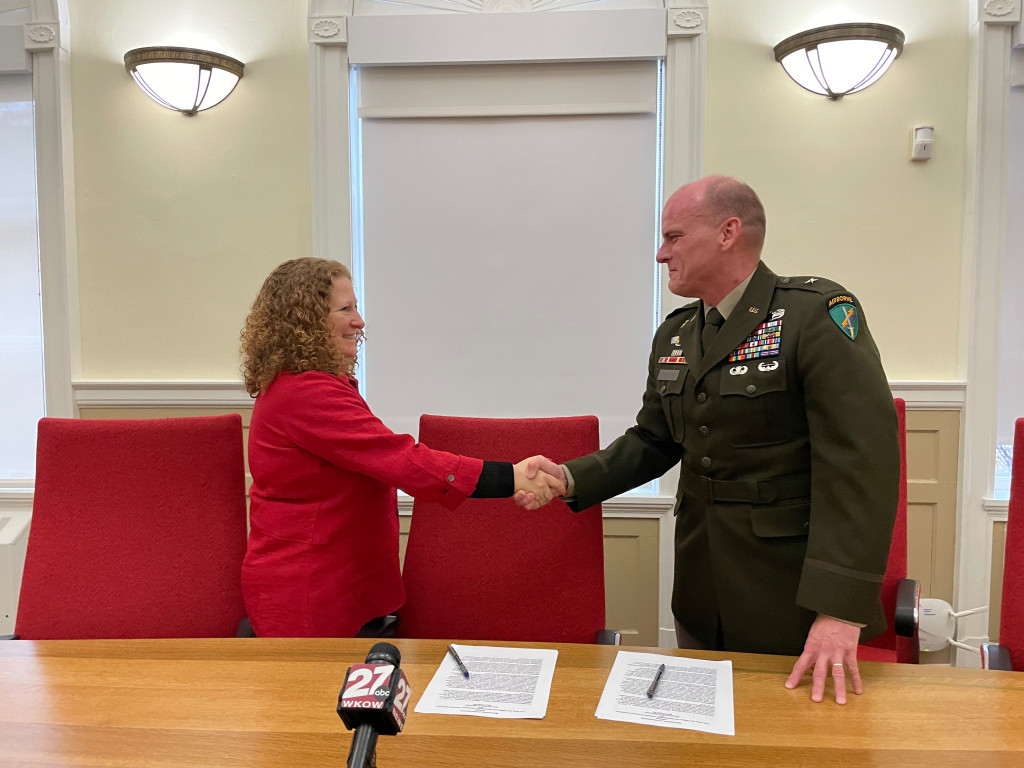UW–Madison, U.S. Army announce partnership on environmental issues

UW–Madison Chancellor Jennifer L. Mnookin and Brigadier General Dean Thompson, 353rd Civil Affairs Command, shake hands after signing the MOU between UW–Madison and the U.S. Department of Defense on Dec. 14, 2022. Jason Gohlke
Representatives of the University of Wisconsin–Madison and the United States Department of Defense (DOD) signed a memorandum of understanding Wednesday, launching a two-year pilot program to work collaboratively on training, consultation and resources for environmental-related issues for the U.S. Army Civil Affairs and Psychological Operations Command (Airborne).
“UW–Madison’s leadership in environmental studies positions us as an ideal partner for the U.S. Department of Defense,” says UW–Madison Chancellor Jennifer L. Mnookin. “Our interdisciplinary environmental research and education, combined with our experience partnering with governments, businesses and communities will assist in addressing the complex environmental problems faced by Civil Affairs personnel.”
UW–Madison’s Nelson Institute for Environmental Studies will serve as campus lead for this partnership. Established in 1970 and renamed in 2002 for U.S. Senator Gaylord Nelson (WI), founder of Earth Day, the Nelson Institute’s expertise stretches from the physical and social sciences to engineering, medicine and the arts and humanities.
“The Nelson Institute’s research centers serve as laboratories and incubators for solutions to the world’s most critical environmental challenges,” notes Paul Robbins, dean of the Nelson Institute. “This partnership fits perfectly within our work to advance a more environmentally, economically and socially sustainable world through innovation and collaboration.”
With hundreds of environmental experts across its schools and colleges, UW–Madison can serve as a comprehensive resource for environmental science, monitoring, management, conservation and restoration. According to the MOU, which creates no obligation or commitment of staff or other resources for either party, UW–Madison will support DOD by:
- Providing training materials, workshops and conferences and research opportunities
- Integrating proven management practices and technology into exercises, internships, cross-training and mission assignments
- Assisting with analysis and recommendations for environmental projects
- Supporting outreach to the wider military and environmental professional communities
“Environmental factors often lead to conflict, and conflict often leads to environmental degradation. Our Civil Affairs teams frequently deal with these issues,” says Brigadier General Dean Thompson of the U.S. Army’s 353rd Civil Affairs Command. “The United States Civil Affairs and Psychological Operations Command (Airborne) is grateful that the UW–Madison Nelson Institute for Environmental Studies is willing to partner with us to address these critical issues.”
Civil Affairs military government specialists, also known as “38G” specialists, are experienced personnel who advise, enable and assist commanders and their civilian counterparts. 38G Civil Affairs officers with a “4E” environmental skill identifier have expertise in land use for the protection of human health, natural resources and native ecosystems.
A history of collaboration
UW–Madison and the DOD have a collaborative and ongoing relationship. As far back as World War II, Civil Affairs personnel received training on campus. In 2020-21, the DOD awarded UW–Madison researchers $54.8 million, 7% of $745 million in annual federal research funds awarded to the university.
UW–Madison was the first academic institution to partner with the Defense POW/MIA Accounting Agency (DPAA) through the University of Wisconsin Missing in Action Recovery and Identification Project (UW MIA RIP). The university is a member of a consortium that allows investigators to apply for limited DOD medical research funds. Also, UW–Madison is one of 22 universities nationwide participating in the DOD-funded Project Global Officer (Project GO), an intensive summer language program for ROTC students.
Subscribe to Wisconsin Ideas
Want more stories of the Wisconsin Idea in action? Sign-up for our monthly e-newsletter highlighting how Badgers are taking their education and research beyond the boundaries of the classroom to improve lives.




